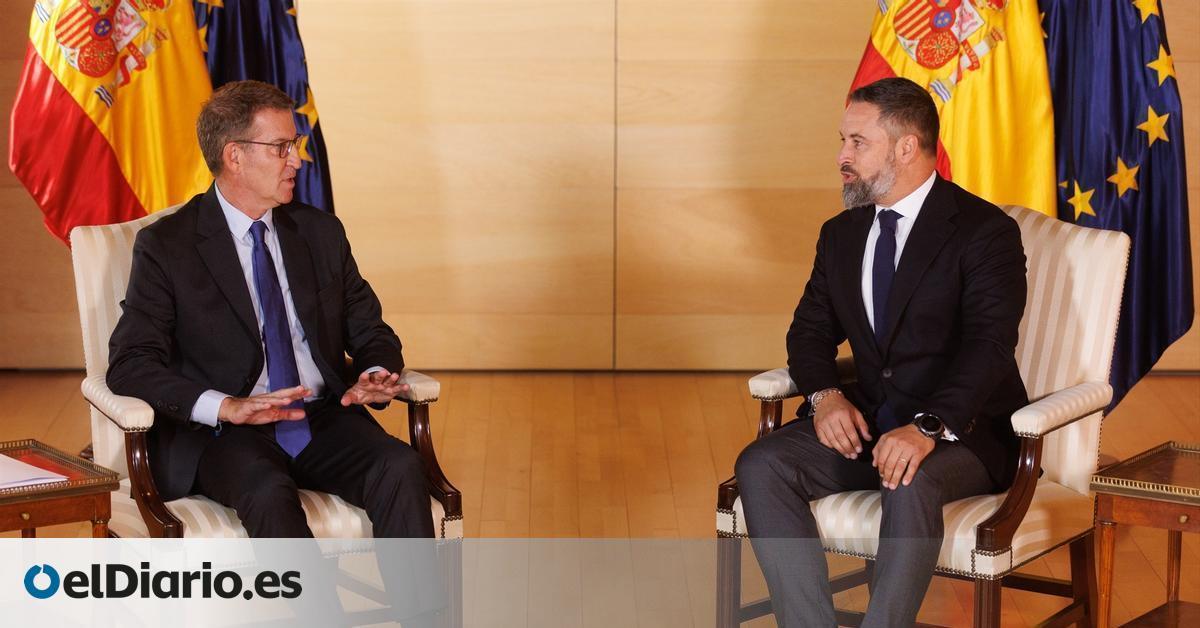
“There will be a given moment when the people will want to hang him by his feet.” Twelve words uttered from Argentina by the leader of Vox, Santiago Abascal, referring to Pedro Sanchez and that have ruined the PP’s strategy before the first parliamentary debate on the amnesty law, which this Tuesday will be admitted for processing in Congress. Alberto Núñez Feijóo will defend the PP’s rejection of the rule from the stands, but in the party they fear that the PSOE, through the mouth of its spokesperson, Patxi López, will know how to take advantage of the ammunition they have been given from the extreme right.
The anger with Vox at 13 Génova Street in Madrid is palpable. As is the annoyance over the words spoken by the leader of the extreme right taking advantage of the inauguration of Javier Milei. So much so that the first reaction was to undervalue Abascal’s statements.
In a statement issued on Sunday night, the PP called the reaction to what Abascal said “victimization of the PSOE”, pointed to an “artificially expanded controversy” and described Abascal’s phrase as “alleged offenses on the other side of the puddle”. Regarding his ally in autonomous communities and city councils, a single assessment: “We do not share Santiago Abascal’s statements.”
The next day, Monday, Feijóo announced in an interview on Telecinco his direct participation in this Tuesday’s debate. The strategy is to accuse the Government of being “cowardly” in the face of the expected absence of both the president and the ministers. Sánchez, on a trip to Strasbourg. The rest of the Executive, because they have a control session in the Senate at the same time.
The PSOE has opted for the lowest possible profile in the processing of the law. By leaving it in the hands of the parliamentary group, they not only speed up the procedures and avoid predictably negative reports from the supervisory bodies, but the Government’s participation is optional.
But now, on top of that, they receive a “balloon of oxygen” in the form of an outburst from Abascal. This is how the PP spokesperson, Borja Sémper, described Abascal’s phrase in the usual Monday press conference, in which the deputy secretary of Culture also tried to distance himself from the statement sent by his own party less than 24 hours before.
Sémper pointed to the “ethical rejection that any sane person expresses in the face of this type of demonstration.” An “ethical rejection” that did not exist on Sunday night. Feijóo was the first to expressly “condemn” Abascal’s words about Sánchez.
But in the PP they are transparent in stating that, beyond the “ethical rejection”, there is a “political reason” to be dissatisfied with their ally for torpedoing their strategy. “Whenever the Government has a problem, whenever it is in trouble, it has the virtue of coming to their defense to give them a boost of oxygen, which is what these demonstrations have meant,” Sémper noted about Abascal. “There is talk in Spain about this and there is less talk about amnesty,” he noted. “That’s what it means to have blended in with Vox,” they say from Moncloa.
Against the “political tension” of others
Sémper also made a general amendment to the “political crisis” that, he said, Pedro Sánchez promotes to “divide Spanish society” and “create two large irreconcilable blocs in Spain.” “We believe this is a determined action and a strategy decided by the current Government, and that it has necessary collaborators, such as Mr. Abascal,” he added.
The spokesperson for the PP leadership regretted that the “high tone ends up contaminating society.” He said that “there is an opportunity for Spain that does not resign itself to politics being a quagmire.” He asked to “speak politely,” not “encourage confrontation.” And he settled: “This is what we are going to do with daily and daily example, and certainly not taking the bait that this government is often going to give us.”
“The country is not for jokes, nor for skirmishes nor for politicking,” the spokesperson concluded. Of course, without referring in front of the microphones to the “son of a bitch” that the president of Madrid, Isabel Díaz Ayuso, snapped at Sánchez in the guest gallery of Congress, during the investiture debate. Nor did Sémper want to refer to the “chascarrillo” of the current PP parliamentary spokesperson, Miguel Tellado, who said in the same press room in Genoa that Sánchez “should leave this country in a trunk.” Or the slogan “let Txapote vote for you” that the right expressed during the double electoral campaign of this 2023 despite the criticism of the victims of the ETA terrorist. Not even the “pathological tic” that Feijóo pointed out in the President of the Government.
Given the contradictions between Sunday’s communication and the defense of political ethics launched on Monday, sources from the PP leadership assured that the spokesperson’s words prevail.
Abascal recovers the “cowardly right”
In the PP they maintain that Abascal’s phrase facilitates the PSOE’s debate on the admission for processing of the amnesty law, which will be voted on this Tuesday in Congress. It will allow Patxi López to make a “rally” intervention in which she mixes the norm with the words of the Vox leader or the riots of recent weeks at the socialist headquarters on Ferraz Street in Madrid.
From the leadership of the main opposition party they even compare Vox “with the first Podemos”, which “spoke that fear had to change sides.” In the opinion of the PP leaders, Pablo Iglesias’ famous phrase is comparable to Abascal predicting for Sánchez the same end that the Italian fascist dictator Benito Mussolini had.
In recent weeks Vox has raised the tone against its government partner in communities and city councils, although without daring to break those coalitions. In fact, in the PP they maintain that the anger of the extreme right has more to do with the fact that Feijóo’s party did not give up the presidency of any of the parliamentary commissions that they have achieved.
In a tweet, Abascal described the PP as “nostalgic for the cowardly right,” a term that Vox coined against Pablo Casado when he tried to distance himself from the extreme right. “Better a wall against the coup than sitting with the coup plotters to negotiate policies, commissions and seats,” settled in his message of response.
absent government
This Tuesday’s debate will be held with the foreseeable absence of all or a good part of the Government. Pedro Sánchez will fly after the Council of Ministers to Strasbourg, where on Wednesday he will speak in the European Parliament to close the semester of the Spanish presidency of the EU.
The rest of the Cabinet will have to attend the first session of the legislature’s control of the current Government in the Senate. The amnesty will also be debated in the Upper House, but the media focus will be divided between both institutions instead of focusing on just one.
This same Tuesday, Congress must vote on the admission to processing of the amnesty law, which will then be studied in committee for urgent processing that will shorten the deadlines as much as possible.
But the creation of three investigative commissions that are part of the investiture agreement between Pedro Sánchez and the pro-independence parties will also be voted on. The first will deal with “the so-called ‘Operation Catalonia’ and the actions of the Ministry of the Interior during the Popular Party governments in relation to the alleged irregularities that link senior police officials and commanders with the existence of a parapolice plot.” In the same sense, a parliamentary investigation will be debated and voted on “on espionage and interference with privacy and intimacy, through the Pegasus and Candiru malware, against political leaders, activists, lawyers, journalists, institutions and their families and associates.” . And finally, “on the right to know the truth and the implications derived from the attacks in Barcelona and Cambrils on August 17, 2017.”
Source: www.eldiario.es

